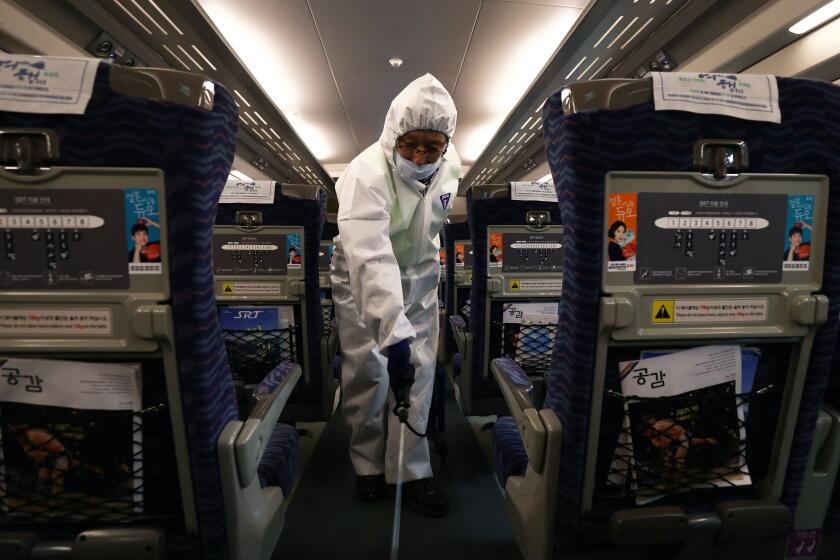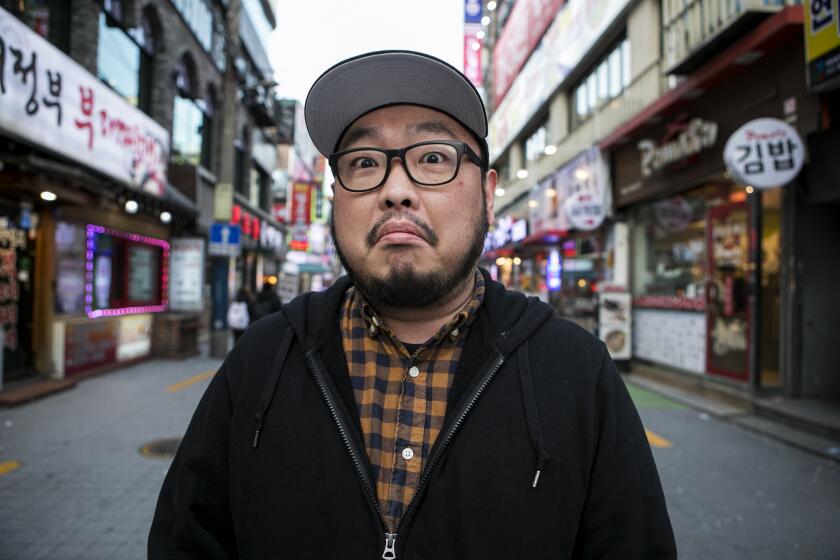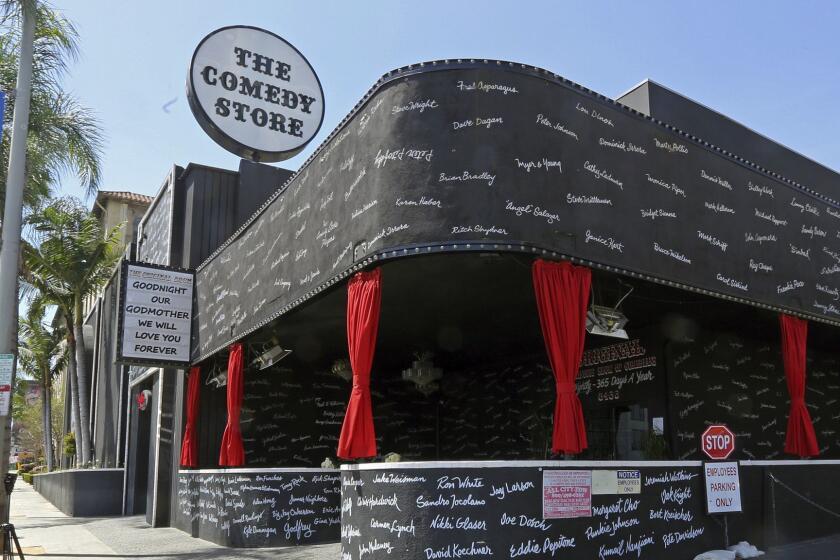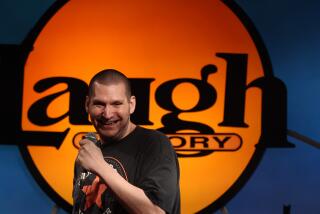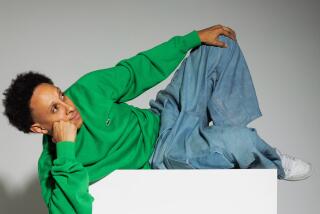Coronavirus kills the joke for L.A. comedians, as clubs shutter and UCB lays off staff
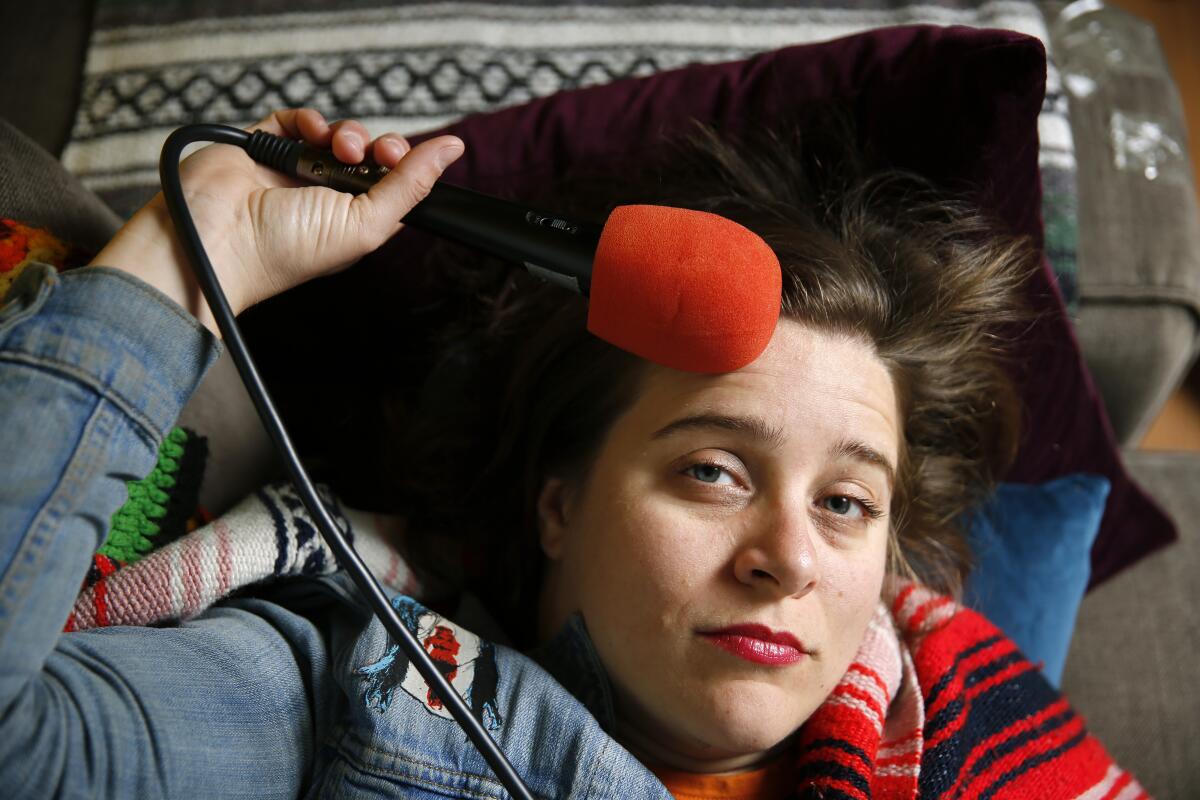
- Share via
“Wow, man, what a week — like, my head is spinning,” said Adam Carolla from the stage of the Laugh Factory in Hollywood on Saturday night. “I can’t wrap my head around the finale of ‘The Bachelor.’ Pete dumped Madison at the very end!”
The joke landed in the busy room, where, despite measures to limit attendance below the government-mandated limit of (at the time) 250 people, nearly every seat on the ground floor was filled. Attendees sat elbow-to-elbow at many tables, and the waitstaff hustled to deliver drinks and food. If you didn’t know any better, everything looked pretty normal.
Governments and health officials around the world are trying to mitigate the spread of the coronavirus outbreak.
Almost all of the major comedy clubs in Los Angeles had already voluntarily closed in response to the pandemic. The Comedy Store and Hollywood Improv on Friday. The Upright Citizens Brigade — which has since laid off most of its staff in New York as well as L.A. — on Saturday.
But public health recommendations aside, the Laugh Factory had decided to keep its doors open — at least for one more night.
“We think we have an obligation,” said Jamie Masada, the founder and chief executive of the Laugh Factory, before the show. “All of these people need somewhere to let their stress out.”
The night’s emcee, actor and comic Bill Dawes, seconded that notion. “We’re, like, the last club standing!” he called out to the crowd. “Is anyone feeling a little autoimmune-compromised?” he joked, passing out hand sanitizer sprays to the front row.
Someone near the stage coughed loudly — seemingly as a joke. The audience groaned, and there was a brief, uncomfortable silence. The risk of being in a crowded room suddenly felt exceptionally real.
Netflix Is a Joke Fest, originally scheduled to begin April 27, has been postponed until further notice, the streaming service announced on Tuesday.
“You’re looking at me like you’re freaked out,” Dawes continued coolly. “This is an amazing experience we’re all having tonight: We’re out of our homes! Which means, either you’re in your 20s and you’re like, ‘Nothing’s gonna happen to me,’ or you’re married and you’re like, ‘I gotta get the ... out of the house.’”
Masada opened the club’s flagship location in 1979 on the Sunset Strip, and in the 41 ensuing years has never seen a situation like this. He closed the venue during the 1992 L.A. riots (“We put on the marquee, ‘All of our jokes were stolen,’” Masada recalled), but that was just for a few days. Now he was deliberating on closing for at least a few weeks.
“I don’t want to close and say, ‘Who cares about comedians’ rent?’” Masada said. “That’s not what the Laugh Factory is about.” But on Sunday night, after Mayor Eric Garcetti ordered an effective shutdown of the city, the decision was made for him.
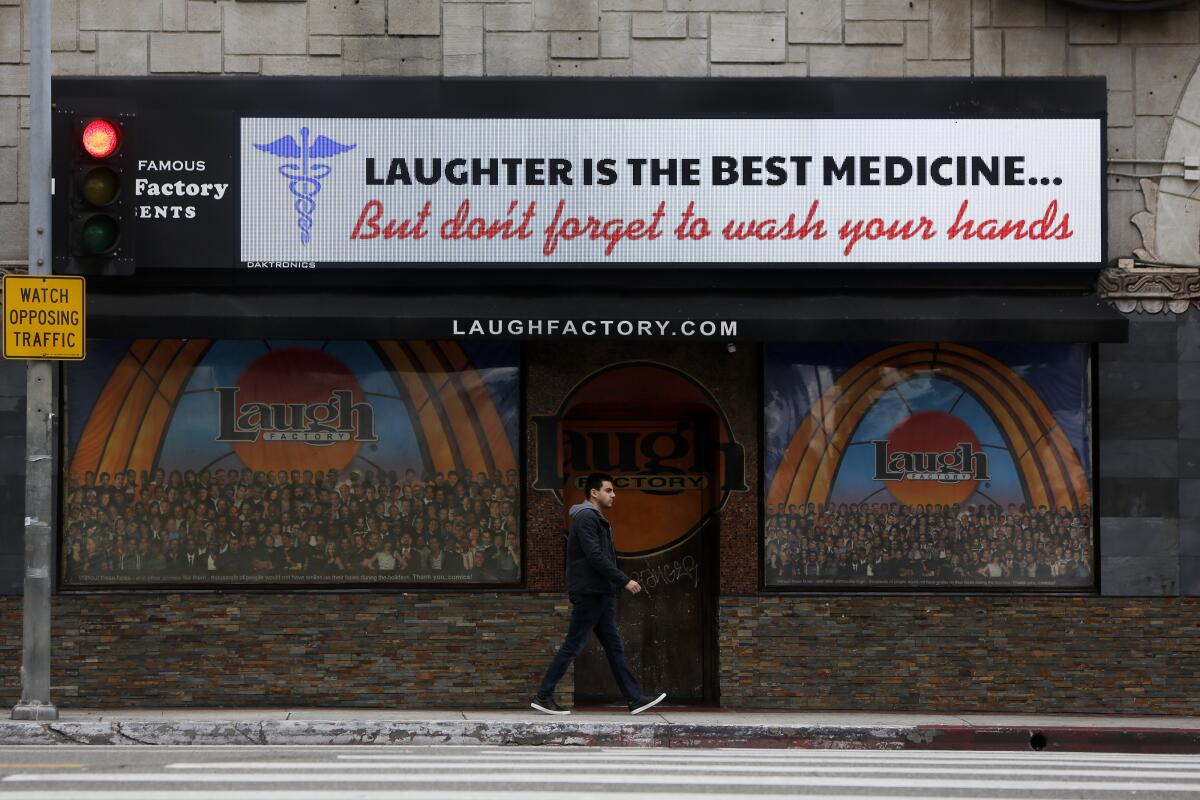
Masada isn’t the only one expressing concern for comedians in the face of a total club shutdown. For many working comics, particularly those who rely on touring, finances have already been extremely tight for years — even before things ground to a halt this week.
“I don’t think people really realize how on the razor’s edge most [comedians] live,” said Brandie Posey, who already has had to cancel more than a month’s worth of touring (and counting). “I have side jobs that I do, but most of them are gig-economy things,” which are now also on hold.
Jackie Kashian, who called from the road, where dates were being canceled left and right, saw a big hit coming for herself and her colleagues: “In the last couple days I’ve lost $10,000 of work,” she said. “And I’m [touring] with Carmen Morales this week — she works at the [Comedy Store]. That’s her day job. So she lost her day job today, too.”
Danny Cho felt like he’d hit a wall in Hollywood, that opportunities for Asian American performers were always going to be limited. So he took his comedy act to Korea.
Like many creative fields, comedy has seen its rates stay mostly stagnant in recent years. Pay for a stand-up set lingers well below $100 on average in Los Angeles, particularly at smaller venues, where unpaid gigs are common. And this dynamic has taken hold while the cost of living has surged: Over the last 10 years, the average rent in L.A. has increased by 65%, while average household income has increased by just 36% in that same time.
“There’s comics who don’t have any [financial] buffer, especially because they’re still paying for features what they were paying back in the ’90s when I was featuring,” Kashian said. (A typical stand-up set consists of an opening spot, a feature spot and a headlining spot.) Masada said he knew of performers who were taking the bus to appear at his club.
“I know a comic who’s supposed to be working a cruise right now,” said Thom Tran, the Laugh Factory’s director of marketing and media relations, himself a comic. “Cruises pay pretty well, and a lot of comics do cruises. But that whole industry is shuttered, so for them to come home and find that the major comedy clubs are also closed in L.A. — financially that’s a hit.”
Rates outside of L.A. tend to be slightly higher, which is why many comedians rely on touring to earn a living. Dave Ross just had to cancel a seven-day run in the South, in addition to losing a seven-date headlining spot on a now-canceled East Coast tour. “I really blocked my life out this year to make touring what pays for everything,” he said. “It was a big plan.”
Ross cited an upcoming Instagram Live gig, which was set to encourage donations to those affected by coronavirus, as an example of the absurdity of the situation: “I’m down to do stand-up whenever, so … of course I’m in, I’ll help whoever. But it was also funny because I was like, ‘I’m affected by coronavirus!’ It doesn’t even occur to other comedians that this is my [only] job. That’s how little money we make.”
Most every comedian seems to agree that shutting down the clubs is the right thing to do. (“Cancel all comedy shows! For the love of God!” was actor and comic Kate Berlant’s take via email.) And club owners seem to fully understand the severity of the situation: “The more information that comes in, the more it’s clear that people should not be going out,” said Jamie Flam, founder of Dynasty Typewriter, which closed earlier than most other comedy venues, on March 12.
“Obviously, the necessary steps are being taken to protect the public’s health, but it sucks — not even just money-wise,” says Jerron Horton, a TV writer on shows like “I’m Dying Up Here,” and a regular on the stand-up circuit. “The scene has been decimated. Especially for the average comic who’s at home during the daytime or writing or whatever, our entire social life revolves around seeing each other, making strangers laugh.”
The clubs were helping him and his friends keep it together as the world got crazier outside. “My last two [stand-up] spots, my fiancée wanted me to not do them, but it was hard,” Horton said. “While I was there, or while I was on stage, things felt normal.”
“I’m part of this [Laugh Factory] family because I was wounded in Iraq and comedy saved my life,” Tran said. “So I know better than most how important comedy is.” Tran is concerned that “people are going to need to laugh” during this unprecedented global health crisis; that this is when comedy clubs are needed most — not the time to lose them altogether.
Until some semblance of normalcy returns to L.A. nightlife, though, comedy performers will be forced to push extra hard on alternative forms of income: live albums, merchandise, podcasts — literally anything anyone can think of to make some cash. Currently, if you Venmo Brandie Posey $10, she’ll send you a joke and a card. Todd Barry joked on Twitter that he is “three gig cancellations away from joining Cameo,” the app that allows celebrities to record personal messages to fans for a fee.
![“I don’t think people really realize how on the razor’s edge most [comedians] live,” said Brandie Posey.](https://ca-times.brightspotcdn.com/dims4/default/b7709ae/2147483647/strip/true/crop/4000x2667+0+0/resize/1200x800!/quality/75/?url=https%3A%2F%2Fcalifornia-times-brightspot.s3.amazonaws.com%2Fc3%2F2f%2F7c47f59c4251a179eab3eba0c926%2Fla-photos-1staff-507648-la-et-comedians-clubs-cornavirus-238.jpg)
For certain brand-name comedians, the clubs closing will not deeply impact their bottom line. “When I look at these moments in time, all I think is, ‘Oh, less [L.A.] traffic for me,’” Carolla said this week on his popular podcast “The Adam Carolla Show,” which is sponsored by LifeLock and Geico, among others. But especially for those without corporate sponsors, there is a sense that they’ll have to band together to get through this difficult situation.
“Running around like chickens with our heads cut off is literally the worst answer,” said Kashian. “And coughing at each other is also a terrible response. Those are the two bad ones.”
“Something tells me I’ll be OK,” Ross said. “I’m going to run out of money in, like, three weeks, but I think I’ll be OK … We’re all in this together. We’ll figure it out.”
The Comedy Store’s “Potluck” open-mic night has a few ground rules: Buy two drinks, no heckling and absolutely no digital recording of any kind.
Posey was fatalistic. “My credit’s already pretty bad,” she said. “Let’s just run it into the ground, I guess.”
Her wish is that, for audiences, the absence of on-demand live comedy seven nights a week in Los Angeles will lead to some soul-searching. “The thing that I hope comes out of this more than anything,” Posey said, “is that after this — if there is an after this — people are more willing to pay for comedy than they are currently.”
Vanessa Ragland, an artistic director at Dynasty Typewriter, sees it the same way: “Hopefully, people in the position to support can really be thoughtful about the things that have brought joy to their life and find creative ways to support them,” she said. “Because very few of your favorite comedians are sitting on a pile of cash and toilet paper.”
More to Read
The biggest entertainment stories
Get our big stories about Hollywood, film, television, music, arts, culture and more right in your inbox as soon as they publish.
You may occasionally receive promotional content from the Los Angeles Times.
